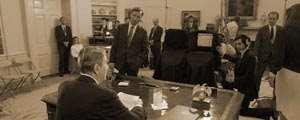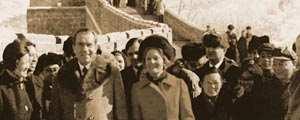Seventy years ago, on March 12, 1947, President Harry Truman delivered a speech to Congress in which he outlined his vision for a new American foreign policy, eventually known as the "Truman Doctrine." Truman argued that the U.S. needed to assume global leadership for promoting and safeguarding democracy, saying, "The free peoples of the world look to us for support in maintaining their freedoms. If we falter in our leadership, we may endanger the peace of the world -- and we shall surely endanger the welfare of our own nation."
Within days of the speech, 75% of Americans indicated they were familiar with Truman's proposal. By the end of the month, that figure had risen to 85%. And signaling that Americans backed his initiative, Truman's job approval rating rose to 60% in mid-March and 63% in late March, up from 48% in January.

The speech was prompted by economic crises in Greece and Turkey that were weakening those countries' ability to thwart communist incursions or revolutions. Truman urged Congress to authorize millions in economic and military aid to Greece and Turkey in the context of the larger need for the U.S. to become a global counterbalance to a growing Soviet communist threat.
Despite Americans' positive reaction to Truman after the speech, they offered mixed support for his proposed aid package. A slight majority of Americans familiar with the speech supported aid to Greece (56%), while less than half favored aid to Turkey (49%).
A large majority of Americans (83%) said they would favor sending domestic "civilian experts" to Greece to help ensure the economic aid was used effectively. But majorities opposed sending American military advisers to train the Greek (54%) and Turkish (55%) armies.
Also, Truman had argued that the United Nations was in no position to provide the kind of aid Greece and Turkey needed. However, in a sign that Americans may have harbored some reluctance about the United States' role, 63% said in late March that the "problem of aid to Greece and Turkey" should be turned over to the U.N.
While Americans may have been ambivalent on some aspects of Truman's plan, they generally agreed with the need for U.S. involvement: 58% said they favored the U.S. taking "a strong stand in European affairs." Another 32% said the U.S. should try to get out of European affairs. In 1947, George Â鶹´«Ã½AV took this to mean, "Eighteen months after the ending of World War II, the country continues to be anti-isolationist in its sentiments."
Read the original Â鶹´«Ã½AV news release.
These data can be found in .
Read more from the Â鶹´«Ã½AV Vault.



